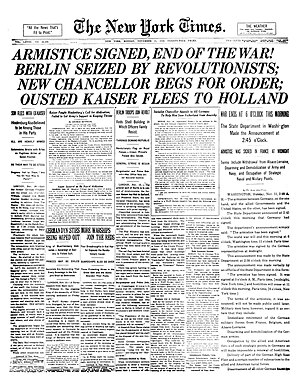Bertl,
,
Armistice Day
Armistice Day is commemorated every year on
11 November to mark
the armistice signed between the
Allies of World War I and
Germany at
Compiègne,
France at 5:45 am, for the cessation of hostilities on the
Western Front of World War I, which took effect at eleven o'clock in the morning—the "eleventh hour of the eleventh day of the eleventh month" of 1918. But, according to Thomas R. Gowenlock, an intelligence officer with the US First Division, shelling from both sides continued for the rest of the day, only ending at nightfall.
[1][2] The armistice initially expired after a period of 36 days. A formal peace agreement was only reached when the
Treaty of Versailles was signed the following year.
[3]
Armistice Day

Front page of
The New York Times on Armistice Day, 11 November 1918
Observed by Belgium,
France,
United Kingdom,
Germany,
Canada,
Australia,
New Zealand,
Serbia,
Romania,
Bulgariaand many other countries
Significance Commemoration of the signing of the Armistice between the
Allied Powers and the
Central Powerseffectively ending all military operations and hostilities in all theatres and fronts of
World War I at Compiègne, France
Date 11 November
Next time 11 November 2019
Frequency Annual
First time World's first official observance at
Buckingham Palace, London, on 11 November 1919
Related to Coincides with
Remembrance Dayand
Veterans Day; and related to
Remembrance Sunday

Armistice Day celebrations in
Philadelphia, Pennsylvania on 11 November 1918
The date is a national holiday in
France, and was declared a national holiday in many Allied nations. In some countries Armistice Day coincides with
Remembrance Day and
Veterans Day, and other public holidays. Armistice Day is not celebrated in Germany, but a German national day of mourning,
Volkstrauertag, has been observed on the Sunday closest to 16 November since 1952





